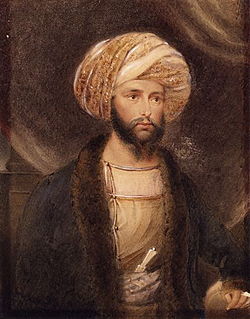James Abbott (Indian Army officer)
Sir James Abbott | |
|---|---|
 James Abbott dressed as an Indian noble. (B. Baldwin, 1841) | |
| Buried | Guildford Cemetery, Guildford, Surrey, England |
| Allegiance | |
| Service/ | British Army |
| Rank | General |
| Unit | Bengal Artillery |
| Battles/wars | First Anglo-Sikh War Second Anglo-Sikh War |
| Awards | KCB |
| Relations | Major General Augustus Abbott Major General Sir Frederick Abbott Major General Saunders Alexius Abbott Keith Edward Abbott |
| Other work | Colonial administrator |
General Sir James Abbott, KCB (12 March 1807 – 6 October 1896), was a British army officer in colonial India.
Family Background
James Abbott was the 3rd son of Henry Alexius Abbott, a retired Calcutta merchant of Blackheath, then in Kent,[1] and his wife Margaret Welsh, the daughter of William Welsh of Edinburgh. He had the following siblings:
- Margaret (1801-1877)
- Major-General Augustus Abbott, C.B. (1804–1867)
- Major-General Sir Frederick Abbott , C.B. (1805–1892 )
- Emma Abbott (1809 - 1875)
- Major-General Saunders Alexius Abbott (1811–1894 )
- Keith Edward Abbott , Consul General (1814–1873)
- Edmund Abbott (1816 - 1816)
Career
He joined the Bengal Artillery at the age of sixteen.[2] He made a name for himself in the northwest frontier region of India in the middle part of the 19th century. In 1839 he undertook a mission to the Khanate of Khiva as part of the Great Game, the contest for influence in Central Asia between the United Kingdom and the Russian Empire. His objective was to obtain the release of Russian slaves in the Khanate to deny the Russians a pretext for invading it. He failed, but shortly afterwards Richmond Shakespear succeeded.
He was one of Henry Lawrence's Young Men, 'advisers' to the Sikhs, after the First Sikh War (1846).[3] He was the first deputy commissioner of Hazara (1849–1853).
As part of the terms of the Treaty of Lahore signed after the defeat of the Sikhs in the First Sikh War, Hazara and Kashmir were going to be transferred to Gulab Singh; Hazara however remained under the Lahore government and governed by James Abbott, who pacified it within a year.[4]
Abbott died in Isle of Wight in 1896,[5] preceeded by wife Anna Matilda Abbott (1859-1870).[6]
Honours and legacy
James Abbott was made a Knight of the Order of Bath in 1894.[2]
The Pakistani city of Abbottabad[3] as well as the district is named after him.[7]
A portrait of James Abbott dressed as an Indian noble was painted in watercolour in 1841 by B. Baldwin (see illustration), now in the collection of the National Portrait Gallery in London, though it is not currently on display.
References
- ^ Biog. Of Henry Alexius Abbot per the obituaries of his prominent sons
- ^ a b Chambers Biographical Dictionary, ISBN 0-550-18022-2, page 2
- ^ a b Isobel Shaw, Pakistan Handbook, Hong Kong, Local Colour Limited, (1998) P.519
- ^ Hazara India : Encyclopædia Britannica Eleventh Edition Article
- ^ http://history1800s.about.com/b/
- ^ http://www.findagrave.com/cgi-bin/fg.cgi?page=gr&GRid=52340117
- ^ About Abbottabad - Abbottabad District website
This article incorporates text from a publication now in the public domain: Chisholm, Hugh, ed. (1911). Encyclopædia Britannica (11th ed.). Cambridge University Press. {{cite encyclopedia}}: Missing or empty |title= (help)
